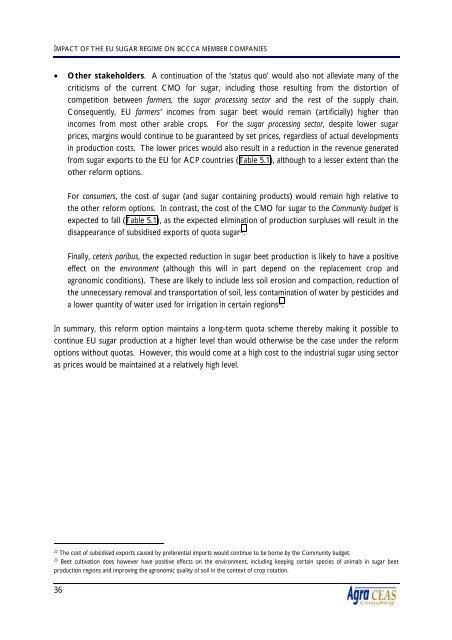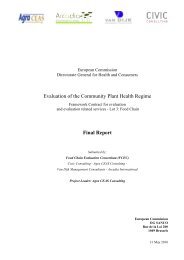2205 final report.pdf - Agra CEAS Consulting
2205 final report.pdf - Agra CEAS Consulting
2205 final report.pdf - Agra CEAS Consulting
Create successful ePaper yourself
Turn your PDF publications into a flip-book with our unique Google optimized e-Paper software.
IMPACT OF THE EU SUGAR REGIME ON BCCCA MEMBER COMPANIES<br />
• Other stakeholders. A continuation of the ‘status quo’ would also not alleviate many of the<br />
criticisms of the current CMO for sugar, including those resulting from the distortion of<br />
competition between farmers, the sugar processing sector and the rest of the supply chain.<br />
Consequently, EU farmers’ incomes from sugar beet would remain (artificially) higher than<br />
incomes from most other arable crops. For the sugar processing sector, despite lower sugar<br />
prices, margins would continue to be guaranteed by set prices, regardless of actual developments<br />
in production costs. The lower prices would also result in a reduction in the revenue generated<br />
from sugar exports to the EU for ACP countries (Table 5.1), although to a lesser extent than the<br />
other reform options.<br />
For consumers, the cost of sugar (and sugar containing products) would remain high relative to<br />
the other reform options. In contrast, the cost of the CMO for sugar to the Community budget is<br />
expected to fall (Table 5.1), as the expected elimination of production surpluses will result in the<br />
disappearance of subsidised exports of quota sugar 22 .<br />
Finally, ceteris paribus, the expected reduction in sugar beet production is likely to have a positive<br />
effect on the environment (although this will in part depend on the replacement crop and<br />
agronomic conditions). These are likely to include less soil erosion and compaction, reduction of<br />
the unnecessary removal and transportation of soil, less contamination of water by pesticides and<br />
a lower quantity of water used for irrigation in certain regions 23 .<br />
In summary, this reform option maintains a long-term quota scheme thereby making it possible to<br />
continue EU sugar production at a higher level than would otherwise be the case under the reform<br />
options without quotas. However, this would come at a high cost to the industrial sugar using sector<br />
as prices would be maintained at a relatively high level.<br />
22<br />
The cost of subsidised exports caused by preferential imports would continue to be borne by the Community budget.<br />
23<br />
Beet cultivation does however have positive effects on the environment, including keeping certain species of animals in sugar beet<br />
production regions and improving the agronomic quality of soil in the context of crop rotation.<br />
36













